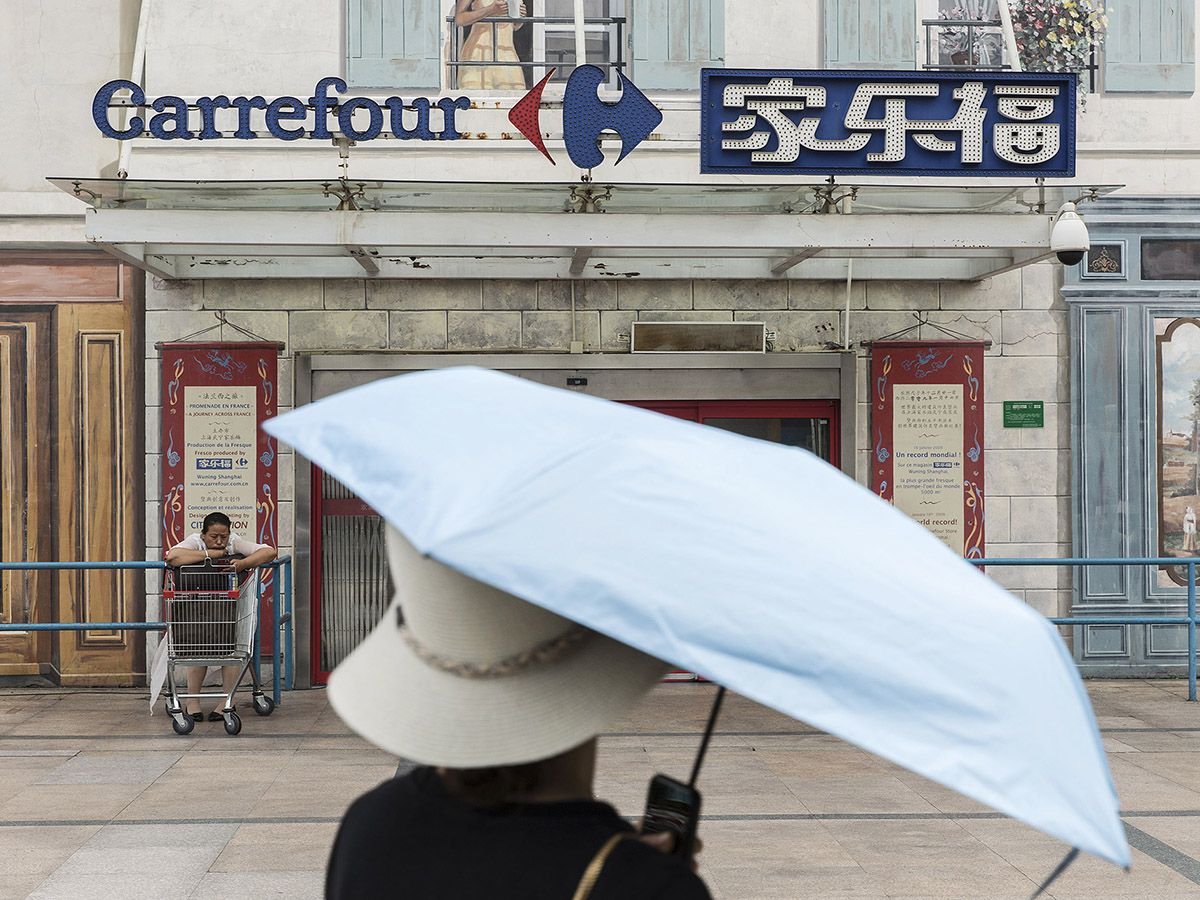Following 24 years of operation in China, Carrefour [CA] has agreed to sell 80% of its Chinese businesses to electronic retailer Suning.com for €620m, joining Tesco [TSCO], Walmart [WMT] and Amazon [AMZN] who have sold stakes to domestic partners.
Carrefour’s share price rose 1.88% over the weekend of the deal, but it fell from €17.32 on the morning of 24 June, the day after the deal was reported, to an opening of €16.99 the next day. It has since risen 6.08% to €17.44 as of 5 July.
After securing a sufficient price in the face of falling sales and operating losses, Carrefour will focus on the French market where it is facing stiff competition from Amazon and traditional rivals like Leclerc. German supermarket Metro AG [B4B] is also reportedly looking to sell its 93-store China operation too. So, have western companies had it with rising operating losses in the region?
Carrefour’s deal with Suning includes a stipulation for the sale of the remaining 20%, should the French firm want out completely from China. Its 2018 sales fell 5.9% and its operating loss was €32m.
Alibaba-backed Suning said the acquisition will allow it to strengthen its brand as well as supply chain management. The deal also puts an end to Carrefour’s preliminary talks to sell a minority stake in its China business to technology giant Tencent, despite previously announcing a partnership last year with the company, leading to the opening of a store in Shanghai.
Rising costs, stiff competition
The news comes following a precipitous rise in rent, food and labour costs in the country as well as the rise of native ecommerce companies such as Alibaba [BABA] and JD.com [JD] catering to a burgeoning market.
But by the end of 2019, China will make up 55.8% of all online retail sales globally, with that figure expected to exceed 63% by 2022. Of the global ecommerce market, the US is expected to drop to 15% by 2022.
Alibaba’s Tmall will lead ecommerce sales in China with a 53.3% share, although this is being eroded slowly by smaller Chinese firms, and JD.com will likely have a 25% stake.
| Market cap | $435.97bn |
| PE ratio (TTM) | 48.19 |
| EPS (TTM) | 3.50 |
| Quarterly Revenue Growth (YoY) | 51.00% |
Alibaba share price vitals, Yahoo finance, 09 July 2019
In grocery shopping, Alibaba has opened 120 Freshippo-branded supermarkets in around 20 Chinese cities since the first store opened in January 2016. The expansion is seen as Alibaba's latest testament to the New Retail concept, where online and offline shopping experience integrates through technology, data and customer engagement techniques.
Worsening performance and US-China relations
Carrefour China reported a net loss of CNY 578m ($84m) for 2018, according to Suning. The news comes off the back of the US Department of Commerce adding more Chinese firms to its trade blacklist on 21 June, further restricting China’s access to US technology.
$84million
Carrefour China's net loss in 2018
The entities are Sugon [603019]; three subsidiaries set up to design microchips, Higon, Chengdu Haiguang Integrated Circuit and Chengdu Haiguang Microelectronics Technology; and the Wuxi Jiangnan Institute of Computing Technology. They lead China’s development of high-performance computing, some of which is used in military applications.
The development is unlikely to aid in thawing relations and, ultimately, help western retailers in China. According to the New York Times, “The move essentially bars them [Chinese firms] from buying American technology and components without a waiver from the United States government, which could all but cripple them because of their reliance on American chips and other technology to make advanced electronics.”
Disclaimer Past performance is not a reliable indicator of future results.
CMC Markets is an execution-only service provider. The material (whether or not it states any opinions) is for general information purposes only, and does not take into account your personal circumstances or objectives. Nothing in this material is (or should be considered to be) financial, investment or other advice on which reliance should be placed. No opinion given in the material constitutes a recommendation by CMC Markets or the author that any particular investment, security, transaction or investment strategy is suitable for any specific person.
The material has not been prepared in accordance with legal requirements designed to promote the independence of investment research. Although we are not specifically prevented from dealing before providing this material, we do not seek to take advantage of the material prior to its dissemination.
CMC Markets does not endorse or offer opinion on the trading strategies used by the author. Their trading strategies do not guarantee any return and CMC Markets shall not be held responsible for any loss that you may incur, either directly or indirectly, arising from any investment based on any information contained herein.
*Tax treatment depends on individual circumstances and can change or may differ in a jurisdiction other than the UK.
Continue reading for FREE
- Includes free newsletter updates, unsubscribe anytime. Privacy policy





